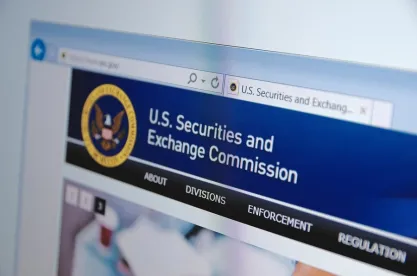Earlier this month, the SEC announced the creation of a new task force to assess the disclosure of Environmental, Sustainability, and Governance, or “ESG,” information.[i] ESG encompasses a broad umbrella of corporate responsibility issues that may manifest themselves in the qualitative reporting categories set forth in Regulation S-K or (somewhat less commonly) the financial statement reporting required by Regulation S-X. Neither regulation specifically identifies categories of ESG information that must be reported. However, issuers are generally required to disclose any ESG risks material to the reasonable investor.[ii] Determination about whether a fact need be disclosed is guided by the Supreme Court definition of materiality, which requires disclosure of any fact that would “significantly alter[] the ‘total mix’ of information made available” to investors.[iii]
The task force will have the twin aims of “identifying material gaps or misstatements in issuers’ disclosure of climate risks under existing rules,” as well as analysis of “disclosure and compliance issues relating to investment advisers’ and funds’ ESG strategies.”[iv] The SEC has not announced any plans for new ESG reporting requirements. Nevertheless, the SEC’s renewed focus on ESG disclosure necessitates the re-examination of what is and is not “material” to investors regarding climate change given recent events and developments, including investors’ expectations and the concrete manifestations of climate risks on companies’ financials.
Investors have shown increased focus on ESG issues in recent years. Capital allocations have increasingly moved toward ESG-focused investments; ESG investment funds matched 2019 cash inflows in the first six months of 2020, and 2019 inflows quadrupled those of 2018.[v] On the same note, the world’s largest investment managers have become increasingly vocal about the consideration of climate risk in investment decisions. Blackrock CEO Larry Fink described climate change in his January 2020 CEO letter as “a defining factor in companies’ long-term prospects” and bluntly wrote that “Climate Risk Is Investment Risk.”[vi] Fink echoed the same sentiments in this year’s letter, declaring that “climate transition presents a historic investment opportunity” amid the record $288 billion global investment in sustainable assets in 2020.[vii] State Street Global Advisors’ deputy CIO Lori Heinel similarly remarked that corporate responsibility on issues such as climate change “creates better quality companies that provide better performance over the long term.”[viii] And a 2019 survey of 300 institutional investors by Morgan Stanley and Bloomberg concluded that “sustainable investing has gone mainstream in the United States,” with 89% of surveyed investors opining that ESG-focused investing would remain a fixture of the investment community moving forward.[ix]
A growing number of catastrophic events with suspected ties to climate change also underscore the materiality of climate risk. PG&E’s Chapter 11 petition filed in the wake of devastating Northern California wildfires was widely dubbed as “The First Climate-Change Bankruptcy.”[x] Hewlett Packard’s principal IT infrastructure in Houston, Texas was flooded during Hurricane Harvey, and HP has since incurred significant infrastructure costs to mitigate similar risks in the future.[xi] In response to these events, HP has augmented its SEC reporting; its most recent 10-K includes a robust discussion of environmental risk, including wildfire exposure in its California headquarters and seismic vulnerability at facilities along the Pacific Rim.[xii] Such reporting may continue to gain traction, particularly as new studies are beginning to unpack potential links between climate change and COVID-19, which has significantly disrupted countless businesses.[xiii]
Even without the creation of the new ESG task force, disclosures like HP’s were thus already likely to become more mainstream in the coming years—both because investors want them and recent events behoove them. Although recent changes in investor sentiment and the lengthy roster of climate-adjacent catastrophic events do not necessarily imply that every undisclosed climate risk is material, regardless of magnitude or likelihood, companies would be wise to take this opportunity to review their qualitative disclosures. This is particularly true given that courts have not yet had opportunity to provide many datapoints from which to analyze the materiality of omitted climate change risks.
[i] See SEC Press Release 2021-42, SEC Announces Enforcement Task Force Focused on Climate and ESG Issues (Mar. 4, 2021), available at https://www.sec.gov/news/press-release/2021-42.
[ii] See Jay Clayton, Statement on Proposed Amendments to Modernize and Enhance Financial Disclosures; Other Ongoing Disclosure Modernization Initiatives; Impact of the Coronavirus; Environmental and Climate-Related Disclosure (Jan. 30, 2020), available at https://www.sec.gov/news/public-statement/clayton-mda-2020-01-30; Commission Guidance Regarding Disclosure Related to Climate Change, 75 FR 6290-01 (Feb. 8, 2010).
[iii] See Basic, Inc. v. Levinson, 485 U.S. 224, 232 (1988).
[iv] Id.
[v]See https://www.morningstar.com/articles/994219/sustainable-funds-continue-to-rake-in-assets-during-the-second-quarter.
[vi] https://www.blackrock.com/corporate/investor-relations/2020-larry-fink-ceo-letter.
[vii] https://www.blackrock.com/corporate/investor-relations/larry-fink-ceo-letter.
[viii] State Street Global Advisors, “Performing for the Future: ESG’s place in investment portfolios. Today and tomorrow.” (2018), available at https://www.ssga.com/investment-topics/environmental-social-governance/2018/04/esg-institutional-investor-survey.pdf.
[ix] Morgan Stanley Institute for Sustainable Investing and Bloomberg L.P., “Sustainable Signals: Growth and Opportunity in Asset Management” (2019), available at https://www.morganstanley.com/assets/pdfs/2415532_Sustainable_Signals_Asset_Manager_2019_L.pdf.
[x]See, e.g., Russell Gold, PG&E: The First Climate-Change Bankruptcy, Probably Not the Last, The Wall Street Journal (Jan. 18, 2019); Chunka Mui, PG&E Is Just the First of Many Climate Change Bankruptcies, Forbes (Jan. 24, 2019).
[xi]See Hewlett Packard Enterprise SEC Form 10-K dated Dec. 10, 2020 at 15, available at https://www.sec.gov/ix?doc=/Archives/edgar/data/1645590/000164559020000056/hpe-20201031.htm.
[xii]Id.
[xiii]See, e.g., David Bressan, Climate Change Could Have Played A Role In The Covid-19 Outbreak, Forbes (Feb. 8, 2021).




 />i
/>i

